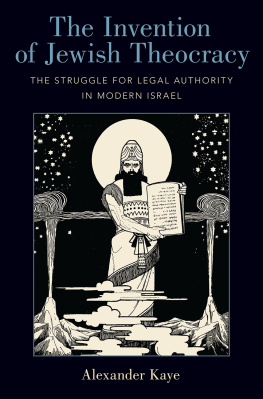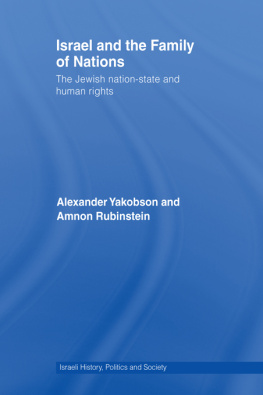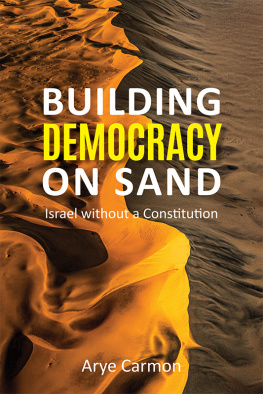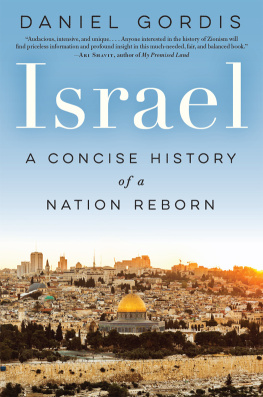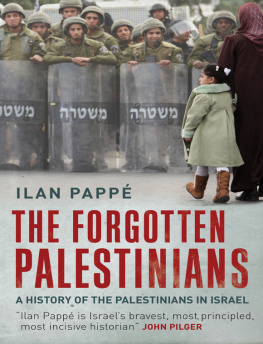Praise for Politically Incorrect
Poignant and painful. Both evocative memoir and sober analysis.
NOAM CHOMSKY
Easy to read, hard to digest.
DANNY SILBIGER, LAWYER
Easily the most important thing I have read on Israel in years, perhaps ever. It gets to the structural underpinnings of the tragic dead end of Israeli life.
PROF. TOM HARRINGTON

Originally published in Hebrew
First edition by Nymrod Publishing House,
Tel Aviv, 2004
Second edition by Maariv publishers,
Tel Aviv, 2011
Revised English edition published by
Skyscraper Publications Limited
20 Crab Tree Close, Bloxham
OX15 4SE, United Kingdom
www.skyscraperpublications.com
First U.K. publication 2016
Copyright 2016 Ofra Yeshua-Lyth
The authors rights are fully asserted. The right of Ofra Yeshua-Lyth to be identified as the author of this work has been asserted by him in accordance with the Copyright, Designs and Patents Act 1988
All rights reserved; no part of this publication may be reproduced, stored in a retrieval system, or transmitted, in any form or by any means, electronic, mechanical, photocopying, recording or otherwise, without the prior written permission of the publisher.
Nor be circulated in any form of binding or cover other than that in which it is published and a similar condition including this condition being imposed on the subsequent purchaser.
A CIP catalogue record for this book is available from the British Library.
ISBN-13: 978-1-911072-04-1
Cover illustration
Red Helicopter
by David Reeb, 2007
Cover design by John Chandler
Typesetting by
Chandler Book Design
Printed in the United Kingdom
by Latitude Press
LIST OF ILLUSTRATIONS
For readers unfamiliar with the divisions into which the major groups of Jews in Israel fall, the following are the terms usually used:
ASHKENAZI
Descendants of Jews of Eastern European origin. In ancient Hebrew, Ashkenaz is Germany
SEPHARDI
Literally descendants of Jews from Spain and Portugal, however the term applies to all Jews from Middle
Eastern and North African descent who have adopted the Sephardic style religious rituals.
MIZRAHI
Literally Eastern, descendants of Jews from communities in Arab countries of the Middle East and North Africa.
With the exception of the Yemenite community, they are also identified as Sephardi. The term Arab Jews is unanimously avoided except in small politically conscious circles.
Part I Hopes (a)
Zionism: the apex of the Jewish national movement which aspired for a normal nation-state but founded Israel instead.
Joseph Agassi, A Philosophers Apprentice:
In Karl Poppers Workshop (from the glossary)
FALLING STARS
Here by hill slopes,
Before sunset and the aperture of time
By orchards with broken shadows
We do what prisoners and jobless do
We nurture hope
Mahmoud Darwish,
A State of Siege Trans. Mohammad Shaheen
H aving set the alarm for one-thirty in the morning, my husband and I loaded our only slightly grumbling, daughter into the family car, and promised her a once-in-a-lifetime adventure. As we set off, we strained our necks towards the night sky, but all we could see were the bright lights of Tel Aviv reflected upwards. Only stopping to join up with a couple of friends and their kids, we passed the citys industrial parks, shopping malls and vast new cemetery, which was already full, then hit the highway leading east.
At the roadblock the soldiers lazily waved us through. Their instructions were to scrutinize incoming traffic only, and we were driving out. Before we knew it, we were cruising along the main street of Biddia. The sprawling Arab city resembled a ghost town at this time of night. The next invasion of Israeli bargain hunters would not start for a few hours. On Saturdays you could barely move your car amid the crush of the bazaar. But now the market stalls were folded away and shuttered. Biddias merchants were presumably fast asleep, anticipating the next windfall.
East of the town, the hills were still a disappointment. The luminous glow of the metropolitan area brightened the horizon, and powerful orange projectors floodlit the roads leading to the fortified Israeli settlements.
We followed the narrowing road, taking curves at dangerous speed to get away from the artificial illumination. The crest of the Samarian Ridge, though, was reasonably dark.
The deserted spot suited our purpose. Further eastward the road descended into the Judean Desert, and the Jordan Valley lay beneath us, with the Hills of Moab on the other side. The weak street lamps of some distant Arab village seemed unobtrusive enough.
We parked our cars in a lay-by, and spread the blankets we had brought over the hard rocks. Faces turned upward, we were ready to catch the Grand Finale of Gods annual fireworks show. The August 1999 meteorite shower was expected to be the best the world had seen since 1956, and the Middle East was positioned for an especially good view.
The trail of a falling star is very delicate. Tiny drops of light burst out of nowhere and disappear at a blink. We soon discovered that you only see the spark if you happen to look in the right direction at the right moment; by the time you spotted one, it was already too late to alert the others. Our shrieks of delight over the celestial objects we managed to spot tore the night air, mixed with bursts of frustrated laughter at the ones we missed. There were long lulls in which nothing happened and then by the time someone called out excitedly, you knew you had just missed a good starburst or even two. When we all noticed a trail at the same time, it was pure joy.
The night was as ordinary and as magnificent as any other summer night in the wilderness. It would have been great to come up here any time and stare at that cosmic beauty, but we were busy urban people with a short attention span, so unlikely to take the time just to gaze at the star-studded dome for no particular reason; we had come to watch some action. Tonight, rocks that had been traveling in space for millions of years were changing shape and spectacularly burning to cinders as they hit the atmosphere, leaving behind just minute trails of light. NASAs website had announced a Perseids Storm.
Ever since a certain ancient comet crashed somewhere near this spot in space a million or so years ago, earth punctually ploughs through its frozen remains late every summer. This information, gained from the mornings newspaper, was now knowledgeably presented to the younger generation. The presence of the three children was allowing us adults to pretend we had come here to share an educational adventure, but it felt more like an existential one. High up on a bare mountain, gazing at the wonders of creation as man has done for thousands of years, it was easy to think big about being small.
But what if we are hit by a big meteor? our friends practical little son asked with alarm on learning that some of the rocks were pretty large. We are quite safe, said the adults dismissively. The atmosphere protects us like a great blanket, grinding the rock and gaseous substances to nothing as they violently crash into it. Even supposing that a meteorite should make it all the way to earth in one menacing piece, there is no chance of it hitting us. No reason at all why it should land of all places here on the Samarian hills, in the middle of the Palestinian Authority.
Dont forget to make a wish! I added, changing the subject.
A moment of silence followed, as we all concentrated on this opportunity. Options were falling out of the sky: time to make a wish and perhaps even see it granted, but where to start? Perhaps we should have drawn up a wish list back home which covered all our worries and hopes, ready to launch at the glittering, falling stars.
Next page


